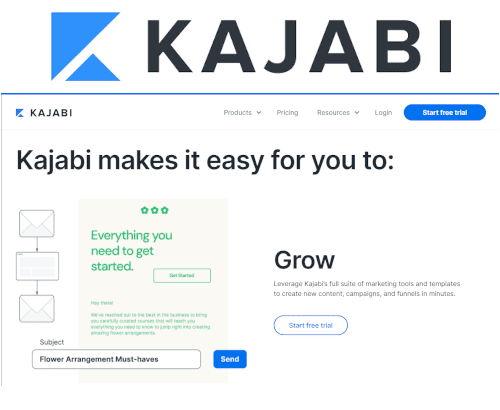Our content is reader supported, which means when you buy from links you click on, we may earn a commission.
How Bethany Wrede Peterson Created ‘Find Your Voice’ to Help Small Businesses Start a Podcast
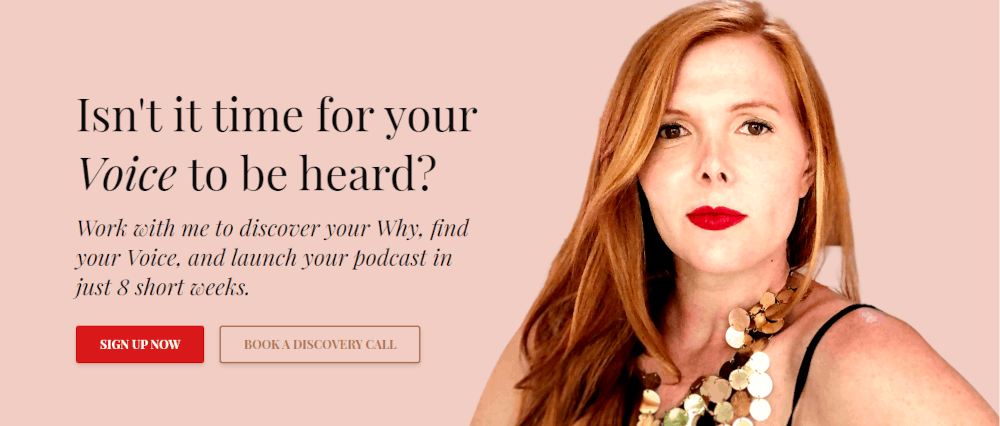
- Who: Bethany Wrede Peterson
- Website: atelierwrede.com and courses.atelierwrede.com
- Course Topic: Podcasting
- Interesting Stats: Sold $5,000 her first month.
Who are you and what course have you created?
I am an interior designer, life coach, and podcast coach. My main market is single men, helping them find their voice in their home and personal life, and I work with solopreneurs to help them find their voice in their small business or personal brand.
I created the course Find Your Voice, a self-paced 8-week podcast launch course for solopreneurs who want to add podcasting to their marketing mix.
What market does your online course serve?
Find Your Voice is geared at creative solopreneurs (and small business owners) who are either creating or reinventing their personal brand and want to start a podcast as part of their marketing efforts. I wanted to help small business owners continue to reach their customers and clients during lockdown; podcasting is a wonderful way to reach your core consumers even when they’re stuck at home.
What’s the biggest benefit of taking your course?
Find Your Voice (FYV) is about so much more than launching a podcast. Of course, all the tactical elements of podcast-building are covered in the course. Distilled to its essence, however, FYV is really about helping students build the courage to project their unique Voice into the world. It’s about helping them build the confidence to discover (or re-discover) their passions, hone their brand’s pillars, speak directly and strategically to one niche consumer, and build their own unique personal brand around their values, passions, and their ‘WHY’.
In creating Find Your Voice, I wanted to create an educational framework where the strategies and brand-building exercises taught will carry on and can be applied to one’s business and mindset long after podcasting is no longer the latest marketing fad.
Another benefit of FYV is that I walk students – step by step – through every aspect of the launch process (which is actually quite labor-intensive). I break the whole process down into simple, digestible, bite-sized chunks, analyzing and citing other podcasts as real-life examples, with each lesson. My no-drama system takes the confusion and overwhelm out, and helps keep students accountable and confident in their abilities to put their pod (and voice) out into the world.
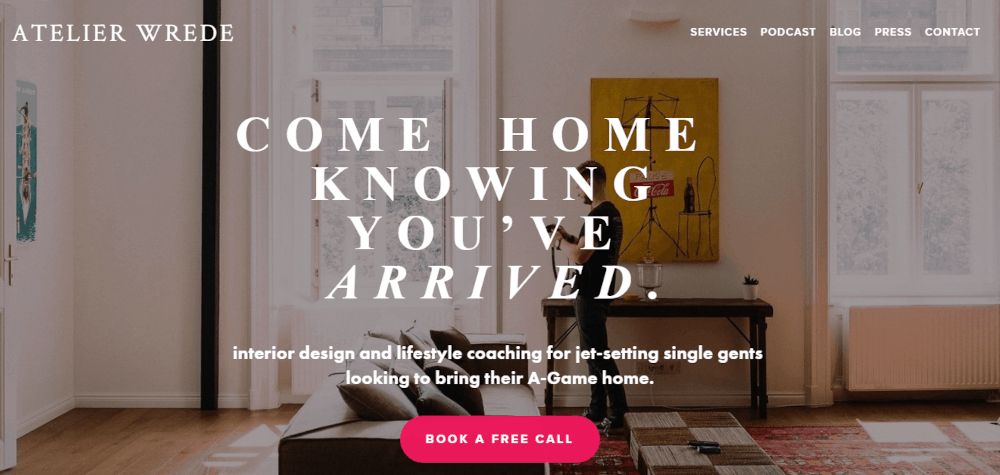
How did you get into the market?
Originally an interior designer, I founded Atelier Wrede in January 2019, as an online design consultancy to help successful single men find their voice and live more authentically at home and in their relationships. I launched my own podcast, ARRIVED. in November 2019 to speak directly to these gentlemen, and help my personal brand gain exposure. I had been a DJ at my college radio station, and have always loved this medium. It’s probably why I chose podcasting over a blog or a YouTube channel.
For months before my launch, I Googled, YouTubed, and bootstrapped nearly every aspect of the launch of my own pod. I couldn’t afford to pay an editing service to walk me through/do for me the intensive launch process. Equally, I procrastinated on nearly every aspect of the launch. That’s because I lacked confidence in my own voice, literally and figuratively.
About four months after I finally launched ARRIVED. A peer in my business coaching group approached me about working with him one-to-one to help him launch his own podcast and find his voice in his personal brand. I initially turned him down. I had basically cobbled together my pod and my core messaging. In my estimation, I wasn’t exactly an authority on podcasting or personal brand messaging, and imposter syndrome hit hard.
But, I had received many five star reviews, and many compliments from peers on my pod’s professional sound quality, the content I was creating for it, and the quality and curation of guests I’d invited onto the show.
When COVID hit the States, my design business dried up. Faced with this uncertain challenge, (and finally realizing that my experience DIYing my own pod could help others save time, money, and take the frustration out of launching a pod – and that in launching my own pod, I found my own voice) I took my peer up on his request.
I firstly devised a 3-part Podcast Launch Strategy Day to help solopreneurs just like me pivot and continue to reach their customers during quarantine – all from the comfort of their own homes.
Why did you decide to create an online course in the first place?
I only needed to work with one client to realize that teaching the same technical and tactical content (e.g., which recording equipment to buy; which software to use; how to get the pod onto all the major platforms, etc) over and over to clients was not only exhausting but not the best use of our one-to-one messaging strategy time. I thought I could just send links and instructions via email. But in attempting this, I soon remembered how many steps are involved in the creation of a pod. Logistically, emailing students/clients wasn’t an effective or convenient way to deliver this part of my service.
It was then that I had the idea to create a private, 8-week video course, only as an addendum to the Strategy Day.
In laying out the original syllabus, however, I remembered that many solopreneurs will be in the same position I was when I wanted to start a pod, and wouldn’t have the funds to invest in working with me one-to-one. So, I realized that it would be more strategic to create this course as a stand-alone, lower touch offer on my value ladder of services.
So, that’s how to Find Your Voice came to really be a course in personal brand messaging, confidence-building, and mindset, as well as a tactical podcast launch course. Students can still engage in self-study on the messaging of their brand, through the course, even if they’re not working with me directly.
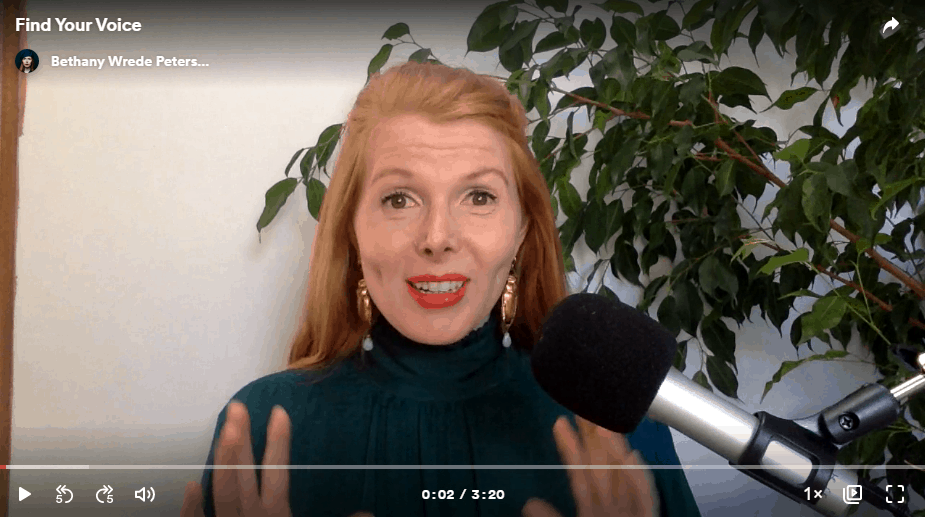
Did you have any moments of doubt before you created/launched it?
Omg, yes! And I still do! In fact, I’m still working on the course build – I’m still recording the last couple weeks of videos right now, and constantly wondering ‘Am I doing this right? Is this really of value? Are people going to get sick of seeing me on these videos every day for two months?!”
There are so many strong women personal brands out there (Jenna Kutcher, Marie Forleo, Rachel Hollis, Melyssa Griffin, Brooke Castillo) – all of whom have insanely successful podcasts, and all of whom work to bolster women small business owners. Some days I think the market is just saturated – what value could I bring that’s even a fraction of what these amazing women don’t already offer in spades?
If so what made you turn it around and do it anyway?
But!
I keep going because I love what I do so much, and because I realized that I’m offering something a bit different from what everyone else is. -Bethany Wrede Peterson Click To TweetI love working with men and women one-to-one to help them find their voice, to help them figure out their WHY. (Who knew that creating a design podcast for single men would lead to me now being a podcast coach for women solopreneurs?)
Once I’ve helped them figure out what it is they stand for, what their brand’s pillars are, and who they really want to help, suddenly it’s like a waterfall of content ideas for my clients – all of whom have come to me feeling stuck, lacking confidence in themselves or their business, and what they’d say in a podcast week on week.
I’ve seen real, true results with my clients, and that is HUGE. And it’s a full circle: because they, then, can help others with their unique voice.
So, indulging the imposter syndrome or playing the comparison game, is really only breaking that circle of positive, abundant energy, so to speak. And that doesn’t help anyone out.
What’s your online course like?
I wanted to create a scalable course that I didn’t have to teach over and over. So, Find your Voice is a self-paced 8-week podcast course with over 40 pre-recorded videos lessons, delivered five lessons a week, with two or more rest, and catch up days baked into the schedule. There are no assessments, only video lessons, and downloadable worksheets and checklists. I use slides and audio clips to teach my content.
How long did it take you to create your course?
I’m still creating it! The course is a drip sequence, so I’m a couple of weeks ahead of them.
Actually, having students taking the course WHILE I’m still creating and recording the modules has really helped to keep me accountable, and to work through any self-doubt on my side. - Bethany Wrede Peterson Click To TweetSuddenly, when you have real-life students, you don’t have time for self-doubt, because they’ve made an investment in you. You have to get over yourself and just deliver.
Tell us a little about the process of launching your course and getting your first sale(s).
After that first sale, two others in my business coaching group approached me about working together, after I had submitted my course idea to the coaching group for feedback. It was unintentional, but it got the offer out to others in my group who were confused about starting a pod and confused about their own brand messaging, and needed my help.

Do you have a lead magnet?
I do have a freebie/lead magnet. I offer the first three days of my course free. It’s a cloned version of my full course, but just Days 1-3. This trial course gives students the knowledge of equipment, software, and recording location. It also gives them the first lesson of the brand messaging aspect of the course. I wanted to offer a great deal of goodwill in the trial period, so students feel confident to buy the full course.
I realized that before someone even invests in my course (or takes the trial) that they may be wondering whether or not they actually want to be a podcaster. That’s because podcasting is so much more intensive than blogging, for instance.
So, I am also producing a 60 min. podcast-style audio upsell to the lead magnet, Have You Got What It Takes to Be a Podcaster? It’s a behind-the-scenes Mastermind featuring five candid interviews with five business owners who use podcasting to attract leads and convert sales. They range from the business owner just starting out to the successful podcaster/business owner with over 300 episodes. I’ll probably price it at $19.97, just to help pay for my ad spend, and build my list.
What’s the traffic strategy that works best for you?
I’m still working on all this! I got my first few clients/students from asking for feedback on my podcast course offer within my business coaching group. I never expected that.
There is a sponsor spot in my own pod for my course, and I have guested on a couple of business pods, to promote the course. I also use my Instagram account to promote the lead magnet. I haven’t yet Sponsored a post on Instagram, but plan to start running Instagram and FB ads once my website has been redesigned.
What online course platform are you using?
Kajabi, Basic plan, and I love it!
I love that it’s all-in-one: course platform, email campaigns, pipelines, website, even promotion. I don’t have to mess about with integrations. Kajabi will suggest pipeline (funnel) architecture for you, so if you’re really green (like me!) when it comes to email marketing, you don’t have to reinvent the wheel trying to figure out how many emails should be in a nurture sequence, or a lead magnet opt-in. etc. They’ve already templated it out, based on Brendon Burchard’s success (he uses Kajabi).
I’m actually at present transitioning my website away from Squarespace and building it back up on Kajabi so everything is literally on one platform. Their customer support is amazing, and you have a dedicated CSM who you check in with at least monthly. They also have tons of live Q&A webinars, monthly virtual meetups, and other self-paced courses you can take about course-building, marketing, etc. I can’t recommend it enough.
Kajabi is the All-In-One Course Platform
Kajabi is one of the top online course platforms used by successful course creators interviewed on coursemethod.com. Kajabi includes email marketing and other tools that make it easy to run your entire business from their platform.
- Price Range: $149 to $399/month
- Most Popular Plan: Growth Plan at $199/month
- Annual Discount: Yes, take 20% off!
- Free Trial: Get a 14-day free trial (credit card required)
Are there any features you wish it had?
I wish their subscription included Zoom webinars. They have some affiliation with Zoom, but your sub doesn’t include Zoom webinars in the plan. I think there’s a missed opportunity there.
What made you decide to use your chosen platform over others?
I can’t even deal with integrations! I’ve heard real horror stories of peers in my business coaching group spending whole weekends tearing out their hair, trying to get their MailChimp to talk to their course platform, to talk to their website cart, etc. Kajabi is really a super easy, super intuitive all-in-one platform designed SPECIFICALLY for online course creators – seriously, it’s awesome!
What other tools do you use to run your online course business?
I’m pretty low-tech at this point. I record the lessons in Zoom, because of the ease and functionality: e.g., you can easily share your screen, with a thumbnail video of yourself or not. Loom and Quicktime were too clunky for me.
I use my podcast mic, my Audio Technica ATR2100 for the sound quality on a boom arm stand. A UBeeSize 10” ring light for lighting. The ‘Touch Up My Appearance’ feature in Zoom is incredible. It really smoothes out your skin, especially if you don’t have access to true professional studio lighting and cameras to shoot your videos. I use Quicktime to edit out bloopers of my video lessons.
I use Canva for slide creation, and Apple Keynote to present the slides while recording in Zoom. And I use Acuity for scheduling and billing Strategy Day clients. Acuity also sends automated reminders and follow-up emails. I’ve linked my Stripe account to both Kajabi and Acuity, so it’s super easy to receive payments.
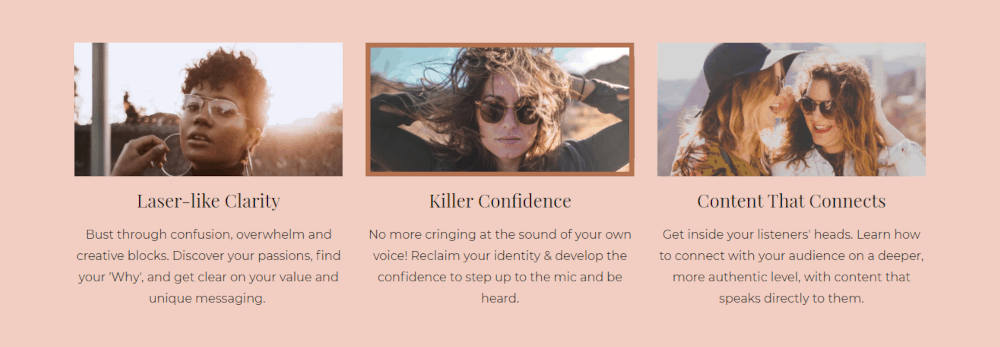
What books or training programs have you found useful on your journey to a successful business owner that others might find valuable too?
Profit First by Mike Micalowicz – every business owner, large or small, should read this. His accounting methods will change how you run your business, and keep your overheads in check. If you’re prone to not paying yourself, this book will make sure you’re running your business to be in profit, and paying yourself handsomely for all your sweat equity.
I also think every business owner should have a business coach, and/or join a coaching group. Find one whose philosophy speaks to you and invest in them. Coaches are worth the expense and will help keep you accountable and charging what you’re worth. I’m loving what millennial personal finance coach Ramit Sethi is doing these days. His book I Will Teach You to Be Rich is a must-read.
Do you have any big mistakes you’ve made along the way that you’d be willing to share?
Not selling my course every day – as in, not promoting and marketing it every day. Selling is still uncomfortable for me. So is “taking” other people’s money. Even though intellectually I know I’m bringing them real value. The value comes in the form of saved time, money, headache, frustration, and helping them to build their business identity as well as get their podcast launched.
It’s easy for me to hide behind course creation, or waste hours making course slides or a sales page that aims to look perfect. But you cannot have a Field of Dreams mentality where “if you build it, they will come”.
We are not Kevin Costner! Nothing sells itself.
If no one knows your course exists because you’re not promoting it every day, whether on socials, ads, in people’s inbox, guesting on pods, being interviewed, etc. and generally shouting from the rooftops, you won’t make any money! -… Click To TweetSelling isn’t automatically pushy or rude, it’s just a part of the business. I am still working on my own mindset on this.
Please share some idea of revenue.
I made $5k the month of launch, between Strategy Days and the Course.
While it’s not money I’d tell someone to quit their day job over, (because unlike a traditional 9 to 5, you won’t have a true idea of consistent revenues for some time) being an online course creator is a long game. Sometimes you’re going to have great months when course sales come easy, and other months are slow. This is the nature of being an entrepreneur in your early stages. There is no such thing as an overnight success.
Please tell us a little about what the money you’ve earned from your course has done for you.
The money that I’ve earned from my course and one-to-one strategy days has provided me with a couple of things.
One: I run my business and my pod on an 11” MacBook Air from 2014. It’s very small and very annoying! I haven’t purchased it yet, but I can now buy a new 16” MacBook Pro. That way I can run my business on something more human-sized! I’ve put the rest aside into my retirement stock portfolio. That feels good, to be able to put away savings again, instead of simply bootstrapping.
From a mindset perspective, it’s proof of concept, to a degree. It helped me realize that my experience, even though I taught myself how to podcast, is valuable, and is of value to others.
Making that first $5k in my course was huge. It allowed me to pay myself back from the waitressing job I took to help bootstrap my business when I was making no money at it. Waitressing is an honorable job, and I have so much respect for those in the service industry. They work hard.
With that said, working 5 days/week on my business, and then waitressing until 1 AM on my Saturdays wasn’t sustainable. I’d have to work, on my feet, on average 19+ hours to make the same amount of money as I would by selling my scaleable course to ONE person. You can scale a course, but you can’t scale shift work.
So, I’d say to anyone thinking about starting a course, that even if you’re not looking to be a course creator as your main focus, that you already have something you can teach – and make money from. Creating a scalable course can be a wonderful, sustainable supplement to your regular work, or help you through a rough financial patch, such as a lay-off.
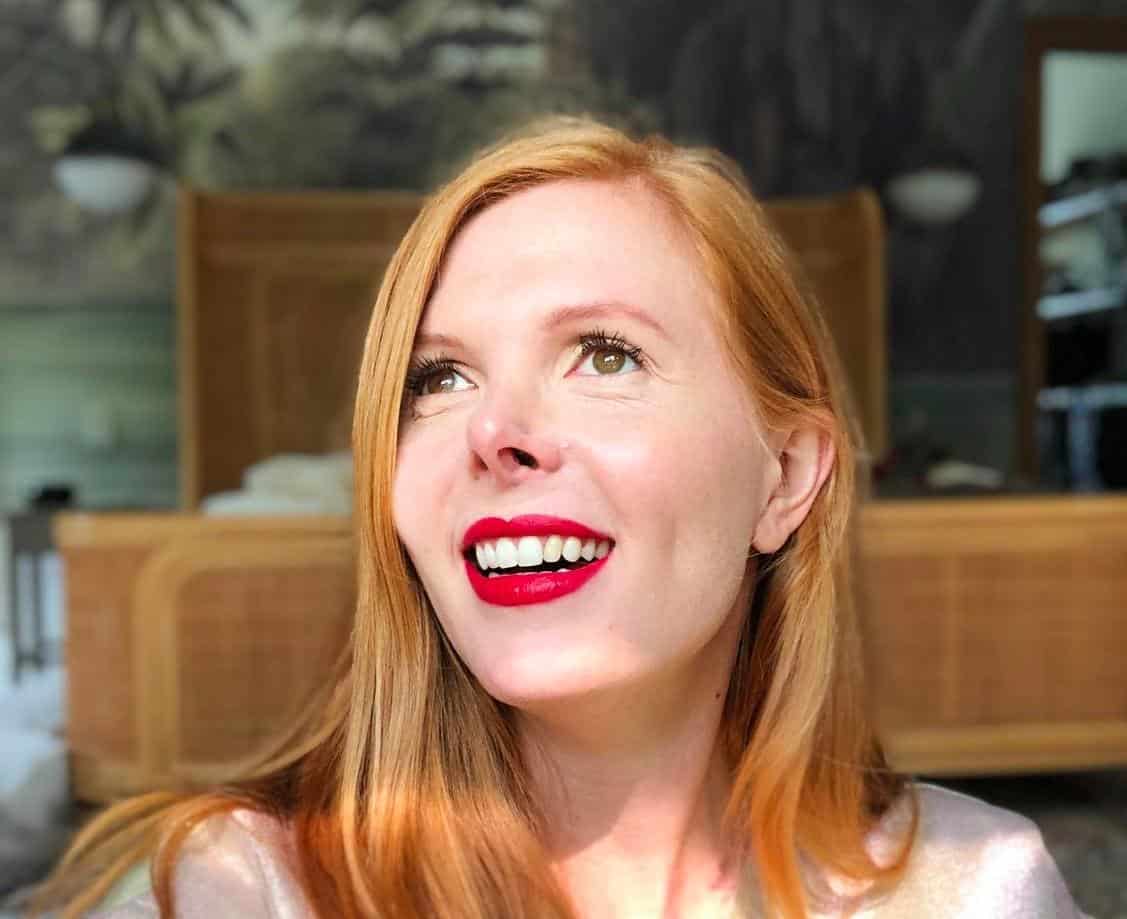
What has creating your course done for you personally?
Going from an industry (interior design) where nothing about your work is scalable to building a course, where I do the work once and sell it over and over again is massive! It’s a huge shift in how much energy I have now to show up for work.
Do you have a story of a transformation from any of your clients?
My client Susan had a real transformation in our work together. It was an incredible feeling to have Susan prepare for me a Client Success Video. She described our work together as “liberating… life-changing…and worth every penny.”
Receiving this was just about the best thing I could ask for, as a small business owner. Yes, of course, testimonials help convert leads into sales. But it was remarkable to hear Susan’s story documented. It’s a reminder to me to keep showing up for my clients and students every day. We all have the power to help and teach others – receiving this testimonial was a powerful reminder of this for me.
What advice do you have for people just starting out?
Don’t wait to have your whole course created before you start marketing and selling it. If it’s a longer course, get a week done. That way you can stay comfortably ahead of your students. Then start marketing it. Having paying students to sign up and start taking the course will keep you accountable to actually finish course creation and combat imposter syndrome.
On this, know that you don’t need to have ALL the answers (no one does, not even the big name course creators!).
Trust that if you've got experience and insights that can help other people a few steps behind you save time, money, hassle, frustration, headache – that has value, and people deserve to have access to your expertise. -Bethany Wrede… Click To TweetTake the time to break down your experience into a coherent, step-by-step “escape and arrival framework” (aka a course syllabus) and you’ve got a course that’s just waiting to be taken.
On the notion of value, don’t undercut your prices to keep up with the competition. It’s a race to the bottom, and it only hurts other course creators. Equally, students look at a course priced too LOW as not having value. They won’t take the content of the process seriously. In short, your students need to have skin in the game to engage your content and teaching.
And don’t expect to sell a thousand courses overnight!
If you launch a course, and sales start out slow, that doesn’t automatically mean that your course isn’t wonderful, that people don’t want it, that you need to slash your prices, or that you’ve failed. -Bethany Wrede Peterson Click To TweetThis feedback might simply mean you need to up your marketing strategy, rethink your launch plan (closed cart vs open cart, added bonuses, etc); refine your ad copy, lead magnet, etc.
Learn more about Bethany Wrede Peterson of atelierwrede.com:
- Website: atelierwrede.com and courses.atelierwrede.com
